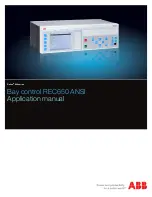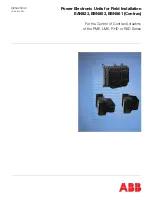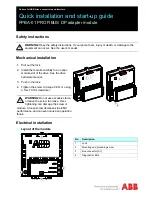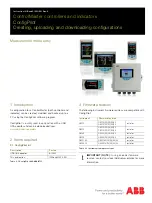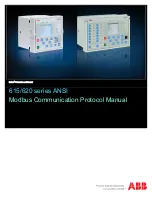
85
C h e c k o u t P r o c e d u r e f o r P u m p C o n t r o l l e r
10. Verify that the proper fuses are installed in the output circuits of the motor starter, alarm light and horn, and auxiliary.
11. If telemetry is used, verify the wiring of the interface cable.
Step 2: Operations Testing
Test all of the TCU functions listed below. If the tested function fails, first verify the circuit between the TCU and the
device. When verifying the circuit, check fuses, resistors, signal contacts, isolators, relays bias, and return voltages and
conductors, where applicable, as these components are occasionally subject to failure.
1. Before powering the TCU, place all three H-O-A switches in the Off position.
2. Turn circuit breakers on one at a time. Turn the TCU on last.
3. Verify Hand operation of the contactors (pumps) by placing each of the TCU’s H-O-A switches in the Hand position.
4. Verify that each Pump Run LED illuminates when its respective control is engaged in Hand operation. If the LED flashes,
the TCU has failed to receive the Motor Run Input for the contactor. If this occurs, verify the pump run circuit integrity.
5. Check float input operation by tipping the floats and verifying that the correct, corresponding, Float Input LED is
illuminated.
• When the High float is tipped and the high float is enabled, the bell or alarm should go on.
• If the Low float’s contact is open, the bell or alarm should go on.
• If the TCU is using an analog input for level control, refer to “Chapter 6: Operation Procedures” for information on
setting the level set points along with other options for analog and float back-up operation.
Note:
The alarm light and alarm horn have to be enabled in the TCU’s configuration in order for them to operate.
6. If an alarm silence button is wired, verify the Alarm Silence input is operational by attempting to silence the bell or
alarm. The bell/alarm is silenced by pressing and holding the Alarm Silence Button for 2 seconds after the High float is
tipped. The Alarm Silence input shares the same common, and therefore the same voltage source, as the float inputs.
7. Configure the TCU for the site (station) in which it is installed.
8. Check the TCU’s Alarm screen to verify that all alarms have cleared.
9. Place the necessary TCU H-O-A switches in the Auto position. Allow the water level to rise, or manipulate the level
inputs manually, to verify Auto operation.
10. Verify alternation of the pumps by manipulating the “OFF” and ”LEAD” inputs to the TCU in the correct and natural
order based on what pump mode you have selected in the configuration. The TCU control outputs should respond by
alternating the lead pump position with alternation enabled. Allow for some delay on pump start after the level input is
activated.
Summary of Contents for TCU800
Page 1: ...Installation and Operation Manual T C U 8 0 0 Data Flow Systems Inc P r e l i m i n a r y ...
Page 2: ...Intentionally left blank ...
Page 4: ...D a t a F l o w S y s t e m s I n c Intentionally left blank ...
Page 8: ...ii Intentionally left blank ...
Page 10: ...ii Intentionally left blank ...
Page 56: ...46 C h a p t e r 5 Quick View Analog View Pump Statistics ...
Page 57: ...47 U s e r I n t e r f a c e Alarms Settings Screen 1 Settings Screen 2 ...
Page 58: ...48 C h a p t e r 5 Advanced Settings About ...
Page 77: ...67 O p e r a t i n g P r o c e d u r e s TCU Installed in Existing Control Panel ...
Page 87: ...77 M o d b u s S u p p o r t Figure 1 Figure 2 Figure 3 ...
Page 92: ...82 D a t a F l o w S y s t e m s I n c Appendix ...
Page 157: ...147 D a t a F l o w S y s t e m s I n c ...
Page 158: ...148 D a t a F l o w S y s t e m s I n c ...
Page 159: ...149 D a t a F l o w S y s t e m s I n c ...
Page 160: ......
































